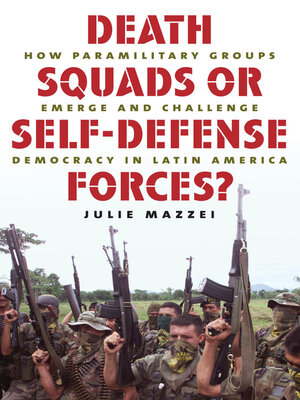Death Squads or Self-Defense Forces?
ebook ∣ How Paramilitary Groups Emerge and Challenge Democracy in Latin America
By Julie Mazzei

Sign up to save your library
With an OverDrive account, you can save your favorite libraries for at-a-glance information about availability. Find out more about OverDrive accounts.
Find this title in Libby, the library reading app by OverDrive.



Search for a digital library with this title
Title found at these libraries:
| Library Name | Distance |
|---|---|
| Loading... |
In an era when the global community is confronted with challenges posed by violent nonstate organizations — from FARC in Colombia to the Taliban in Afghanistan — our understanding of the nature and emergence of these groups takes on heightened importance. Julie Mazzei’s timely study offers a comprehensive analysis of the dynamics that facilitate the organization and mobilization of one of the most virulent types of these organizations, paramilitary groups (PMGs).
Mazzei reconstructs in rich historical context the organization of PMGs in Colombia, El Salvador, and Mexico, identifying the variables that together create a triad of factors enabling paramilitary emergence: ambivalent state officials, powerful military personnel, and privileged members of the economic elite. Nations embroiled in domestic conflicts often find themselves stuck between a rock and a hard place when global demands for human rights contradict internal expectations and demands for political stability. Mazzei elucidates the importance of such circumstances in the emergence of PMGs, exploring the roles played by interests and policies at both the domestic and international levels. By offering an explanatory model of paramilitary emergence, Mazzei provides a framework to facilitate more effective policy making aimed at mitigating and undermining the political potency of these dangerous forces.
Mazzei reconstructs in rich historical context the organization of PMGs in Colombia, El Salvador, and Mexico, identifying the variables that together create a triad of factors enabling paramilitary emergence: ambivalent state officials, powerful military personnel, and privileged members of the economic elite. Nations embroiled in domestic conflicts often find themselves stuck between a rock and a hard place when global demands for human rights contradict internal expectations and demands for political stability. Mazzei elucidates the importance of such circumstances in the emergence of PMGs, exploring the roles played by interests and policies at both the domestic and international levels. By offering an explanatory model of paramilitary emergence, Mazzei provides a framework to facilitate more effective policy making aimed at mitigating and undermining the political potency of these dangerous forces.







